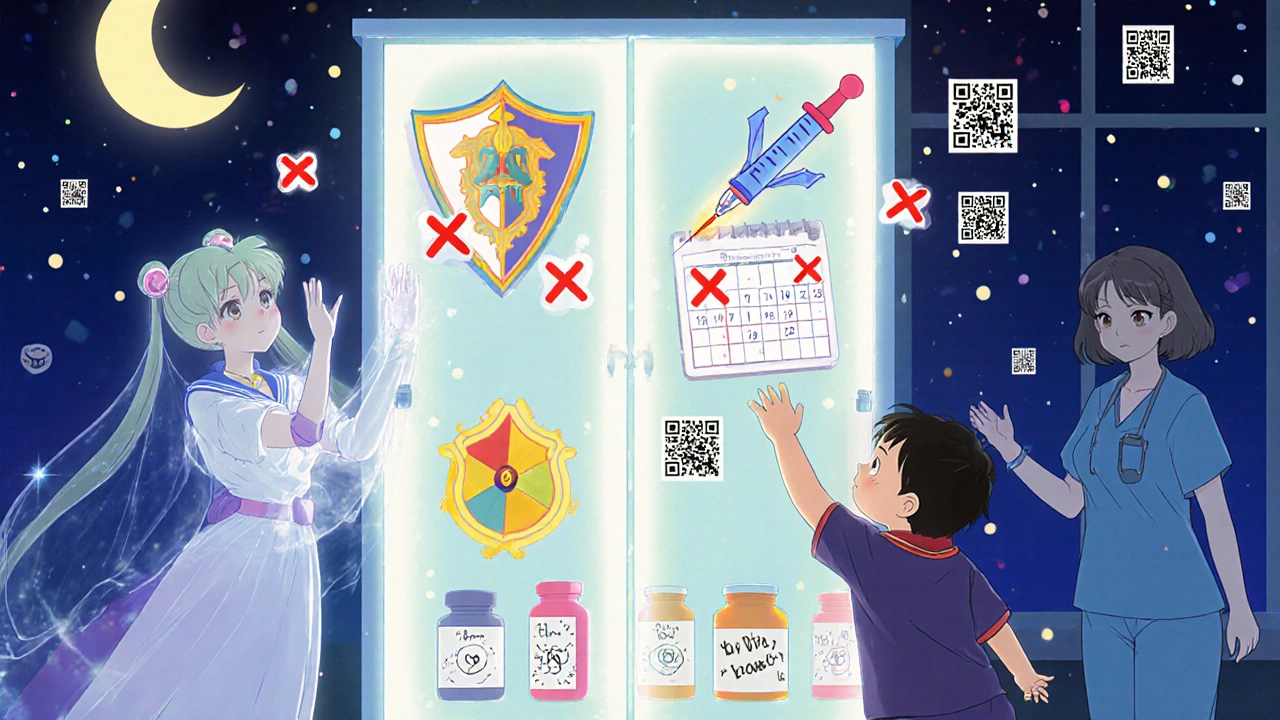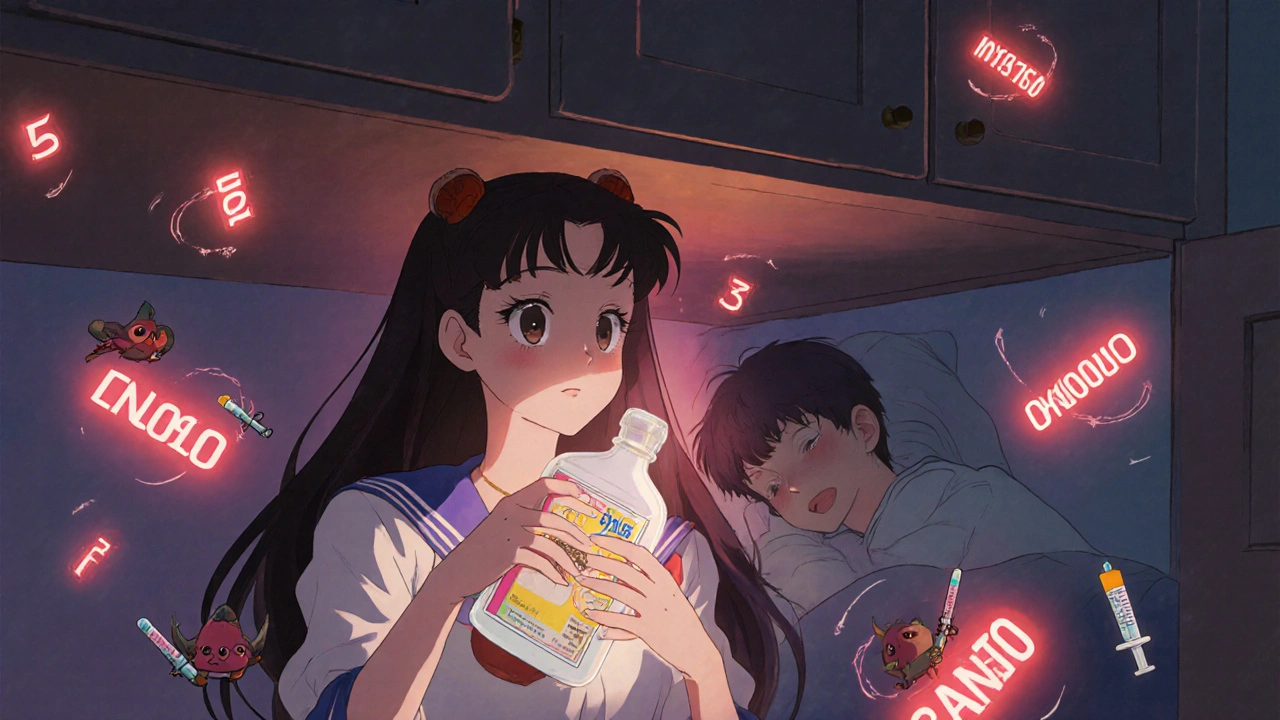Every parent has been there: you find an old bottle of children’s Tylenol in the back of the cabinet, maybe from last winter’s cold, or that liquid antibiotic from the ear infection last year. The expiration date has passed. You look at it. You wonder: is it still okay to give? The truth is, it’s not. And giving expired pediatric medication isn’t just risky-it’s dangerous.
Why Expired Pediatric Medications Are Different
Children aren’t small adults. Their bodies process medicine differently. Their organs are still developing. Their metabolism is faster. That means when a medication breaks down after its expiration date, the byproducts can hit a child harder-and in ways we don’t always expect.The FDA warns that expired medicines may not work at all. But for kids, the problem goes deeper. Liquid antibiotics, for example, lose up to 87% of their potency within 14 days after expiration, according to University of Michigan Pediatric Trauma research. That’s not just ineffective-it’s dangerous. A child might seem to get better, but the infection is still there, hiding. Then it comes back stronger, resistant to the drug, and now harder to treat.
Insulin degrades by 1.5% per month after expiration. Nitroglycerin, used for heart conditions, loses half its strength in just three months. Epinephrine auto-injectors-critical for allergic reactions-drop to only 65% effectiveness six months past their date. And here’s the worst part: some expired meds don’t just weaken. They turn toxic.
Tetracycline antibiotics, when expired, can cause permanent tooth staining and stunt bone growth in children. Benzocaine teething gels have been linked to 127 cases of methemoglobinemia-a rare but life-threatening blood disorder-in kids between 2018 and 2022. Antihistamines can flip from making kids sleepy to making them hyperactive, agitated, even hallucinating. And that’s not speculation. It’s documented in peer-reviewed journals and confirmed by the American Academy of Pediatrics.
What Parents Are Doing Wrong
A 2023 survey by Contemporary Pediatrics found that only 20% of parents knew expired medications were unsafe for children. The rest? They thought it was just less effective. One in five parents admitted they’d given an expired medicine to their child at least once. Nearly half believed it was fine to use medicine up to a year past the expiration date.Why? Because most of us assume medicine is like milk. If it’s a week or two past the date, it’s probably still okay. But medicine doesn’t spoil the same way. It breaks down chemically. And those breakdown products? They’re not harmless. They can irritate the liver, damage kidneys, or trigger allergic reactions in kids whose immune systems are still learning how to respond.
Storage makes it worse. A study showed acetaminophen suspensions lose 22% of their strength if stored above 86°F for 30 days. That’s a hot bathroom or a sunlit drawer. And only 22% of households keep medications in locked cabinets, even though doing so cuts poisoning risk by 76%. Most parents store meds within reach of toddlers. And 62% of children under five can open child-resistant caps in under a minute, according to Consumer Product Safety Commission tests.
Then there’s dosing. Nearly half of parents use household spoons instead of the measuring cup or syringe that came with the medicine. That’s a 38% error rate right there. Combine that with a weakened, expired drug? You’re not treating illness-you’re guessing.
What to Do With Expired Pediatric Medications
The only safe option? Dispose of it immediately. Not tomorrow. Not when you get around to it. Right now.The FDA says: Never flush unless it’s on their official flush list. That list includes only 15 specific drugs-mostly controlled substances like fentanyl patches or oxycodone. Most children’s meds are not on it. Flushing them pollutes waterways. The USGS found 82 different pharmaceutical compounds in 80% of U.S. water samples. That’s not just an environmental issue-it’s a public health one.
Here’s what to do instead:
- Find a drug take-back location. The DEA runs over 16,700 permanent drop-off sites at pharmacies and hospitals. Most Walgreens, CVS, and major hospital pharmacies have them. You don’t need a prescription. You don’t need to be a patient. Just walk in with the expired meds.
- If there’s no drop-off nearby, use the take-home disposal method: Mix the pills or liquid with something unappetizing-used coffee grounds, kitty litter, or dirt. Use a 2:1 ratio (two parts grounds, one part medicine). Put it in a sealed plastic bag. Throw it in the trash. Scratch out your name and the prescription number on the bottle before tossing it.
- For liquid medications, pour them into absorbent material like cat litter or paper towels before sealing. This prevents accidental ingestion by pets or curious toddlers.
Don’t recycle the bottle. Don’t rinse it out. Just remove the label (or at least scratch out personal info) and toss it. The bottle itself isn’t hazardous.
How to Prevent This From Happening Again
Prevention is the best medicine. Here’s how to keep your home safe:- Store meds in locked cabinets, above 5 feet. That’s the height pediatricians recommend. Most poisonings happen when kids reach up and grab something within their grasp.
- Keep everything in original containers. That includes vitamins, cough syrup, and topical creams. Labels tell you what it is, when it expires, and how to use it. Without them, you’re flying blind.
- Check expiration dates monthly for liquids, quarterly for pills. Set a reminder on your phone. Or write the date you opened the bottle on the label. Liquid antibiotics should be thrown away after 14 days, even if the bottle says the expiration is a year away. The FDA and AAP agree: once opened, they’re only good for two weeks.
- Use the measuring tool that came with the medicine. No spoons. No shots. No eyeballing. A teaspoon is not a milliliter. A dropper isn’t a syringe. Accuracy matters.
- Ask your pediatrician about disposal at every visit. Only 31% of doctors bring it up. But when they do, parents are 63% more likely to dispose of meds properly. Don’t wait for them to ask-ask them.

What’s Changing for the Better
There’s progress. In 2023, the FDA partnered with CVS and Walgreens to add disposal kiosks to 12,400 locations. That’s a 47% increase in disposal access in those areas. The CDC’s MedEd program has trained over 18,000 healthcare providers on how to talk to parents about safe storage and disposal. And Safe Kids Worldwide now certifies childcare centers on safe medication practices-over 2,300 have been certified so far.Some pharmacies are even putting QR codes on pediatric prescriptions. Scan it, and you get a video on how to dispose of the medicine safely. Biodegradable packaging is starting to appear-containers that break down in 90 days if accidentally thrown in the trash. And federal legislation is being considered to standardize disposal rules across all states.
But none of this matters if parents don’t know. The numbers are still grim. Only 28% of expired pediatric medications are properly disposed of. Compare that to 47% for adult meds. That gap is deadly.
What You Can Do Today
Don’t wait for a crisis. Don’t wait for the next cold season. Don’t wait for your child to accidentally swallow something they shouldn’t.Right now, go to your medicine cabinet. Open it. Look at every bottle. Every tube. Every packet. Check the expiration dates. If it’s expired-even by one day-take it out. Don’t put it in the fridge. Don’t hide it. Don’t keep it "just in case."
Find the nearest drug take-back location. Use the DEA’s website or call your local pharmacy. Drop it off. If you can’t, mix it with coffee grounds, seal it, and throw it away. Then lock the cabinet. Put the rest of the meds out of reach. Write the opening date on the bottles. Use the right measuring tool.
Children’s health is fragile. Their medicines must be treated with the same care. Expired meds aren’t a minor issue. They’re a preventable risk. And you have the power to eliminate it.
Can I still give my child expired children’s Tylenol if it’s only a few months past the date?
No. Even if it’s only a few months past the expiration date, acetaminophen can lose potency and may contain harmful breakdown products. Children’s bodies are more sensitive to these changes. Giving expired Tylenol could mean your child doesn’t get the pain or fever relief they need-or worse, they could be exposed to toxic compounds. Always dispose of it properly.
Is it safe to flush expired children’s medicine down the toilet?
Only if it’s on the FDA’s flush list, which includes very few pediatric medications. Most children’s medicines-like antibiotics, cough syrups, or antihistamines-should never be flushed. Flushing pollutes water systems and can harm aquatic life. The FDA and EPA recommend take-back programs or mixing with coffee grounds and trash disposal instead.
What should I do if my child accidentally swallows an expired medication?
Call Poison Control immediately at 1-800-222-1222. Do not wait for symptoms. Even if your child seems fine, some toxic effects can take hours to appear. Have the medication bottle ready so you can tell them the name, amount, and expiration date. Keep the bottle with you when you go to the ER.
Do I need to dispose of vitamins and supplements if they’re expired?
Yes. While vitamins are generally less dangerous than prescription drugs, they can still degrade and lose potency. Some, like liquid iron supplements, can become toxic if broken down. Children may also mistake them for candy. Dispose of them the same way you would any other expired medication: take them to a drop-off site or mix with coffee grounds and throw them away.
How often should I check my child’s medications for expiration?
Check liquid medications every month-especially antibiotics, cough syrups, and antihistamines. Solid medications like pills or chewables should be checked every three months. Set a calendar reminder or write the opening date on the bottle. If you opened a bottle six months ago and it’s still sitting there, it’s time to dispose of it, even if the printed date hasn’t passed yet.
Can I donate unused or expired pediatric medications to charities?
No. No reputable organization will accept expired or even unused medications due to safety and legal restrictions. Even if the medicine is sealed and unopened, it can’t be redistributed. The only safe option is proper disposal through a take-back program or household method.

Conor McNamara
November 17, 2025 AT 16:14Leilani O'Neill
November 19, 2025 AT 07:08Riohlo (Or Rio) Marie
November 20, 2025 AT 15:08steffi walsh
November 21, 2025 AT 04:45Katelyn Sykes
November 21, 2025 AT 05:15Gabe Solack
November 22, 2025 AT 01:10Yash Nair
November 22, 2025 AT 11:52Bailey Sheppard
November 24, 2025 AT 01:55Girish Pai
November 25, 2025 AT 05:10Kristi Joy
November 25, 2025 AT 20:49Hal Nicholas
November 26, 2025 AT 03:48